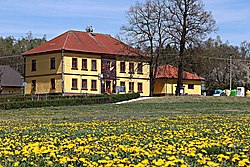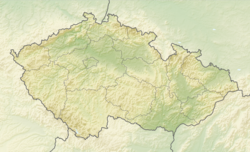Břasy (German: Bschas) is a municipality and village in Rokycany District in the Plzeň Region of the Czech Republic. It has about 2,300 inhabitants.
Břasy | |
|---|---|
 Municipal office | |
| Coordinates: 49°50′10″N 13°35′5″E / 49.83611°N 13.58472°E | |
| Country | |
| Region | Plzeň |
| District | Rokycany |
| First mentioned | 1379 |
| Area | |
• Total | 21.44 km2 (8.28 sq mi) |
| Elevation | 458 m (1,503 ft) |
| Population (2024-01-01)[1] | |
• Total | 2,300 |
| • Density | 110/km2 (280/sq mi) |
| Time zone | UTC+1 (CET) |
| • Summer (DST) | UTC+2 (CEST) |
| Postal code | 338 24 |
| Website | www |
Administrative parts
editThe villages of Darová, Kříše, Stupno and Vranovice are administrative parts of Břasy.
Etymology
editThe name is derived from the folk name for 'heather' (in Czech vřes).[2]
Geography
editBřasy is located about 10 kilometres (6 mi) north of Rokycany and 15 km (9 mi) northeast of Plzeň. It lies in the Plasy Uplands in a largely deforested plateau, which falls sharply towards the valley of the Berounka River in the west. The highest point is the Přešov hill at 505 m (1,657 ft) above sea level.
The Berounka forms the western municipal border. The stream Dírecký potok is a minor watercourse that flows across the municipality into the Berounka. The slopes along the Berounka and the Dírecký potok are largely covered with forest, while the central part of Břasy is largely forestless, except for scattered woods between the Břasy proper, Vranovice, Kříše and Stupno which replaced the abandoned coal mines and other industrial facilities.
History
editThe first written mention of Břasy is from 1379 under its previous name Vranov (German: Wranow). The village rapidly grew in the 19th century thanks to influx of workers into the coal mines. At the turn of the 20th century Vranov had population of 1,200. The name of Břasy originally applied only to small workers' colony which was annexed by Vranov in 1918. In 1960, five municipalities were united under the municipality of Břasy. In 1982, even Vranov proper was renamed Břasy.[2][3]
The main impetus to industrial development was coal mining, area of Břasy became one of centres of Radnice coal basin. In 1893, the Stupno–Radnice stretch of the railway was built. Local network of railway sidings for coal transport evolved between Vranov and Stupno, from 1908 this siding was electrically powered. In 1953, it was abandoned, while the Chrást–Radnice railway operates until now. Mining activity resulted in population growth. Other industrial companies settled in Břasy too, such as glass plant in Vranov (until 1933, later converted to furniture factory, which closed in 1997), ceramics factory in Vranov, iron-foundry in Vranov, another ceramics factory later converted to chemical factory. In 1933 statue in memory of miners by leftist sculptor Emanuel Famíra was built in Vranov, only to be demolished by German authorities in 1941. In 1945, Břasy was liberated both by American and Soviet armies. Post-World War II development was also facilitated by Czechoslovak army's presence in Břasy (ground radar station, after 1989 abandoned). In 1969, coal mining in Břasy stopped.[4]
Stupno was mentioned for the first time in 1146.[2] The village's name evolved from Stúpa to Stupná, and finally to Stupno. Stupno grew into major village and served as a population centre of the agglomeration for most of the 19th century. In 1900, Stupno had population of 1,283.[5]
Vranovice (German: Wranowitz) was mentioned for the first time in 1115.[2] Unlike Stupno and Břasy it did not enter the contiguous built-up agglomeration but it also underwent rapid population growth as a result of industrial development. In 1900, Vranovice had population of 775.[5]
Kříše (German: Krisch) was mentioned for the first time in 1384.[2] It also remains territorially distinct but the industrial development took place in the village proper and population growth occurred here too. With influx of workers the population reached more than 1,300 at its peak in 1890.[5]
Darová (German: Darowa) was mentioned for the first time in 1235.[2] The village is the most outlying part of Břasy. Located in the valley of the Berounka it never really lost its rural character despite some coal and iron ore mining. In 1900, the village's population was 145.[5] Hydroelectric plant was built on the Berounka river at the beginning of the 20th century.[2]
Demographics
edit
|
|
| ||||||||||||||||||||||||||||||||||||||||||||||||||||||
| Source: Censuses[5][6] | ||||||||||||||||||||||||||||||||||||||||||||||||||||||||
Transport
editBřasy is located on the railway line Radnice–Bezdružice via Plzeň. The municipality is served by three train stations and stops: Břasy, Stupno and Dolní Stupno.[7]
Sights
editThe village of Břasy is poor in monuments; the most valuable buildings are located in Stupno. The most important monument in Stupno is the Church of Saint Lawrence. It was built in the pseudo-Romanesque style in 1880–1882. It replaced an old church, which was first mentioned in 1352.[8]
A cultural monument is the tomb of the Sternberg family in Stupno. It is an Empire building dating from 1827.[9]
References
edit- ^ "Population of Municipalities – 1 January 2024". Czech Statistical Office. 2024-05-17.
- ^ a b c d e f g "Informace o obci" (in Czech). Obec Břasy. Retrieved 2021-05-18.
- ^ "Historický lexikon obcí České republiky 1869–2011: Abecední přehled obcí a částí obcí" (in Czech). Czech Statistical Office. 2015-12-21. pp. 76, 263, 547, 635.
- ^ "Historie" (in Czech). Obec Břasy. Archived from the original on 2008-05-02.
- ^ a b c d e "Historický lexikon obcí České republiky 1869–2011" (in Czech). Czech Statistical Office. 2015-12-21.
- ^ "Population Census 2021: Population by sex". Public Database. Czech Statistical Office. 2021-03-27.
- ^ "Detail stanice Břasy" (in Czech). České dráhy. Retrieved 2023-07-25.
- ^ "Kostel sv. Vavřince" (in Czech). National Heritage Institute. Retrieved 2023-07-25.
- ^ "Hrobka rodiny Šternberků" (in Czech). National Heritage Institute. Retrieved 2023-07-25.


